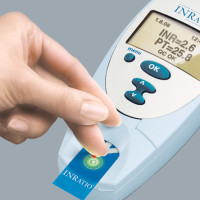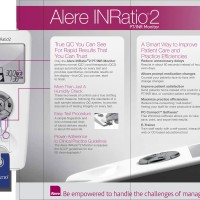
Was Alere aware that the INRatio provided dangerously inaccurate INR readings for almost a decade?
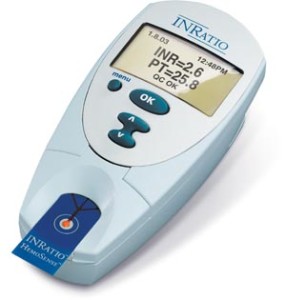 The International Normalization Ratio (INR) is an important measure used to monitor blood coagulation and adjust anticoagulation medications such as warfarin. If a person’s INR level is too low, he or she could be at risk of blood clots or strokes. Conversely, if the INR level is too high, a patient is at risk of excessive bleeding. These health risks can cause serious injury or death. The Alere INRatio monitor system and test strips are used by patients to monitor their INR levels while on warfarin. Because the INR level is critical to a patient’s health, the INRatio’s accuracy and precision is of vital important to a patient’s wellbeing.
The International Normalization Ratio (INR) is an important measure used to monitor blood coagulation and adjust anticoagulation medications such as warfarin. If a person’s INR level is too low, he or she could be at risk of blood clots or strokes. Conversely, if the INR level is too high, a patient is at risk of excessive bleeding. These health risks can cause serious injury or death. The Alere INRatio monitor system and test strips are used by patients to monitor their INR levels while on warfarin. Because the INR level is critical to a patient’s health, the INRatio’s accuracy and precision is of vital important to a patient’s wellbeing.
Although it may appear that problems with the Alere INRatio’s PT/INR readings surfaced relatively recently, the Food and Drug Administration gave two public warnings about problems with the INRatio almost a decade ago. For two weeks during May 2005, the FDA investigated HemoSense’s facilities in San Jose, California. The FDA investigation found serious problems and found that HemoSense failed to report serious injuries that may have been caused by INRatio devices. HemoSense originally developed the INRatio test strips and INRatio monitor system before it was acquired by Inverness Medical Innovations in 2007. Inverness later changed its name to Alere in 2010.
INRatio maker failed to report problems with the device in 2005
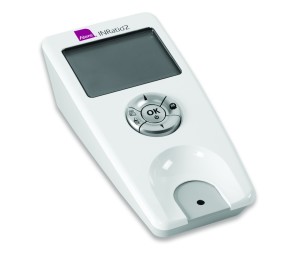 The investigation revealed that HemoSense received information about a patient who went to a hospital after the INRatio indicated that the patient had a 6.1 INR test result, which is dangerously high for an individual on warfarin. The hospital lab found a significantly lower INR value than the patient’s INRatio monitor reported. Federal law requires medical device makers to submit reports known as MDRs within 30 days of receiving or becoming aware of information that suggests a medical device (1) may have caused or contributed to a serious injury or death; or (2) a malfunction of their device that would be likely to cause or contribute to a death or serious injury if the malfunction recurred.
The investigation revealed that HemoSense received information about a patient who went to a hospital after the INRatio indicated that the patient had a 6.1 INR test result, which is dangerously high for an individual on warfarin. The hospital lab found a significantly lower INR value than the patient’s INRatio monitor reported. Federal law requires medical device makers to submit reports known as MDRs within 30 days of receiving or becoming aware of information that suggests a medical device (1) may have caused or contributed to a serious injury or death; or (2) a malfunction of their device that would be likely to cause or contribute to a death or serious injury if the malfunction recurred.
Because the patient had to go to the hospital and required medical intervention to prevent serious injury, the patient’s event satisfied the statutory definition of a serious injury. In addition, the event indicated a malfunction since the INRatio provided an inaccurate INR reading. HemoSense failed to submit an MDR about the INRatio’s erroneous INR readings.
In a warning letter from Oct. 4, 2005, the FDA stated its investigation also found five other complaints about the INRatio that “reasonably suggest [the INRatio monitor and test strips] malfunctioned and would be likely to cause or contribute to serious injury to the patient.” The FDA investigation further revealed that HemoSense received four complaints about the INRatio’s erroneous INR readings after receiving the first complaint that involved the patient going to the hospital lab.
HemoSense responded to the FDA’s investigation, but the FDA found its response inadequate because it failed to provide enough detail and documentation to determine whether preventative actions were sufficient to prevent the recurrence of the INRatio’s erroneous INR readings. The FDA additionally warned that the INRatio maker’s reporting procedure did not comply with federal law and may not lead to proper determination of a reportable injury or death that may have been caused or contributed to by an INRatio monitor. The FDA warned HemoSense to fix its reporting procedures and that malfunctions with the INRatio could result in regulatory action being initiated against it, including seizure, injunction, and civil money penalties.
the INRatio maker’s reporting procedure did not comply with federal law and may not lead to proper determination of a reportable injury or death that may have been caused or contributed to by an INRatio monitor
In 2006, the following year after being warned about serious problems with the INRatio monitor, the FDA again investigated and warned HemoSense about serious problems. This investigation found:
- Failure to properly handle complaints
- Failure to investigate devices that do not meeting performance specifications
- Failure to investigate products labeled and distributed with the wrong strip code
Yet again, this FDA investigation found HemoSense’s responses inadequate and found that the INRatio maker failed to take proper corrective and preventative actions.
INRatio maker failed to investigate problems in 2006
The 2006 FDA investigation found that HemoSense again failed to investigate problems with its INRatio device. The investigation found that INRatio test strips were validated for a 15-month shelf life from the manufactured date, but the packaging only indicated a 12-month shelf life. HemoSense received a complaint about discrepant INRatio test strip and lab results, but did not investigate the complaint because the test strip in question was past the 12-month window, but still within the 15-month shelf life window for which the test strips are validated by the FDA. In essence, HemoSense certified to the FDA that its products were valid for 15 months, but packaged the products as only valid for 12 months and ignored complaints about problems with its products if they fell after 12 months from the manufacture date.
HemoSense also received a complaint from a professional use that an INRatio INR reported a reading that was “way off.” Yet again, HemoSense failed to investigate this complaint because the event fell within the 12 to 15-month period.
…received a complaint from a professional use that an INRatio INR reported a reading that was “way off.” Yet again, HemoSense failed to investigate
According to the FDA warning letter dated Nov. 29, 2006, HemoSense received several other complaints about the INRatio providing erroneous INR results. HemoSense’s unresponsiveness to complaints and general neglect was detailed in the FDA warning letter, including the following:
- Complaint received on Dec. 21, 2005 about the INRatio providing erroneous results. On Feb. 14, 2006, HemoSense determined that an investigation was needed. Three months later, no investigation had been performed.
- HemoSense received a complaint on Sept. 9, 2005 about a patient being hospitalized after receiving erroneous INRatio results. On Jan. 19, 2006, HemoSense determined an investigation was warranted. An investigation into malfunctions with the INRatio was not performed until 200 days after receiving the complaint.
- HemoSense received a complaint on March 1, 2006 about a patient receiving inaccurate INR readings from the INRatio monitor. The patient was admitted to a hospital. On April 7, 2006, HemoSense decided an investigation was necessary, but failed to perform one because the test strip’s lot number was not provided in the complaint.
- HemoSense missed the 30-day reporting deadline when it received a copmlaint that a patient was admitted to a hospital in December 2005 after receiving an inaccurate INR reading from an INRatio monitor.
- HemoSense failed to ensure that its employees were adequately trained as required under federal law (21 CFR 820.25(b)).
- In another instance, HemoSense failed to submit a required report about an INRatio malfunction until 115 days after receiving a complaint that the INRatio provided an erroneous INR reading.
- On March 2, 2006, HemoSense received a complaint about discrepant INR results between the INRatio and a hospital lab. This malfunction “resulted in a death” and although a report about the death was filed within 30 days, a report about the malfunction was not filed until 38 days after receiving the complaint.
Problems with the INRatio PT/INR monitor system have been known for years
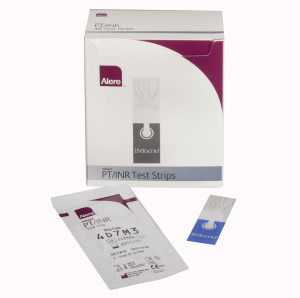 Although the FDA has been aware of serious problems with the INRatio PT/INR monitor system and test strips for many years, serious action has been taken about the malfunctioning products until recently. In early 2014, Alere, the company which acquired HemoSense and its INRatio products, issued a recall of INRatio test strips. In December 2014, Alere issued a recall of its INRatio and INRatio2 PT/INR monitor systems after receiving almost 19,000 complaints, including three deaths.
Although the FDA has been aware of serious problems with the INRatio PT/INR monitor system and test strips for many years, serious action has been taken about the malfunctioning products until recently. In early 2014, Alere, the company which acquired HemoSense and its INRatio products, issued a recall of INRatio test strips. In December 2014, Alere issued a recall of its INRatio and INRatio2 PT/INR monitor systems after receiving almost 19,000 complaints, including three deaths.
It appears Alere has been aware of serious problems with the INRatio monitor system for many years. The Cochran Firm, D.C. is investigating legal claims related to Alere’s dangerous INRatio PT/INR monitor system and test strips that put patients’ health at risk. If you or someone you love suffered a serious injury after using an INRatio monitor system and/or test strips, please call us at 202-682-5800 or 1-800-THE-FIRM (843-3476) for a free, prompt, and confidential case review. You can also fill out an online contact form and a legal professional will get in touch. Strict time deadlines apply (sometimes less than a year), so we recommend contacting us at your earliest convenience.


